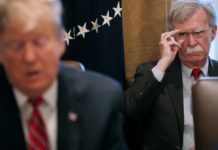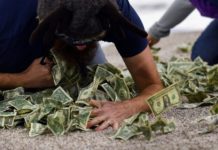HONG KONG — The mysterious Chinese oil company raised eyebrows wherever it went. It struck high-profile and politically sensitive deals in Russia, the Czech Republic and elsewhere. Its executives hinted at deep connections within Beijing’s halls of power as well as with China’s powerful military. Then, its founder and chairman vanished.
Today, investigators in the United States are trying to unravel the extensive business relationships of the company, known as CEFC China, and its offshoots. Federal prosecutors now say that an executive at its nonprofit arm explored businesses beyond oil: brokering arms deals in other countries and looking for ways to dodge American sanctions on Iran.
In a filing on Tuesday in a federal court in New York, prosecutors said that the executive, a former Hong Kong city official named Patrick Ho, discussed using the company’s connections to help sell weapons to Chad, Qatar and Libya. The prosecutors also accused Mr. Ho of exploring whether CEFC could serve as a middleman for an Iranian company to gain access to funds from a Chinese bank under international sanctions.
Edward Kim, a lawyer for Mr. Ho, declined to comment on Wednesday. CEFC did not respond to a request for comment. Federal prosecutors did not say whether any of these deals went through and did not press additional charges.
The allegations add a potential new dimension to what is currently known about CEFC. Virtually unknown just a year ago, it leapt onto the global stage when it said it would buy a $9 billion stake in Rosneft, the state-controlled Russian oil giant.
CEFC was a major player in a sector exclusively the domain of big state-owned enterprises, earning a reputation for being politically well connected. Its chairman, Ye Jianming, cultivated relationships with foreign leaders — he was a special economic adviser to the Czech president — and CEFC aligned itself with China’s geopolitical ambitions to expand its influence overseas in recent years, scooping up strategic investments in countries in Europe, the Middle East, Africa and Central Asia.
But the company has since come under a cloud. Mr. Ye disappeared in China earlier this year. A state-owned Chinese conglomerate, Citic, has taken over many of its international assets. It is now one of a number of ambitious Chinese companies that has turned from a big buyer to a big seller of global assets, as Chinese leaders ratchet back on debt and financial risk in the world’s second-largest economy.
In New York, federal prosecutors alleged last year that Mr. Ho, a deputy to Mr. Ye and the head of CEFC’s think tank, offered millions of dollars in bribes to President Idriss Déby of Chad and Uganda’s foreign minister, Sam Kutesa, in exchange for oil rights in the two countries. Mr. Déby and Mr. Kutesa have denied the allegations.
Mr. Ho has also denied the allegations.
The new allegations focus on what federal prosecutors said was email correspondence between Mr. Ho and Cheikh Gadio, a former Senegalese foreign minister. Prosecutors have accused Mr. Ho of trying to bribe Mr. Déby, the president of Chad, through Mr. Gadio with $2 million in cash. Prosecutors agreed to drop charges against Mr. Gadio last month and signed a non-prosecution agreement with him. In return he has agreed to testify at the trial about his knowledge of Mr. Ho’s attempt to bribe the president of Chad.
In excerpts from the emails submitted by prosecutors, Mr. Gadio appealed to Mr. Ho to help Mr. Déby crush the Islamist group Boko Haram.
“Do you think CEFC can intervene with the Chinese state to get an urgent, extremely confidential and significant military weapon assistance to our friend who has engaged in the battle of his life against the devils of Boko Haram?” Mr. Gadio wrote, referring to Mr. Déby.
Mr. Ho responded to say he had received the “important message” and that it was being “given the highest level of consideration.”
On paper, Mr. Ho ran the nonprofit arm of CEFC and hosted forums about energy security and the “Belt and Road Initiative” campaign by President Xi Jinping to promote China’s influence overseas. Many of these conferences drew big crowds and featured a senior Chinese People’s Liberation Army general and American officials.
But according to the United States government, at the same time Mr. Ho was also laying the groundwork for bribes that involved both money and arms, sometimes writing in emails about the risks involved in such transactions.
In March 2015, Mr. Ho received an email from a person offering to provide an inventory of arms, according to prosecutors. He told the individual to “find a way to pass them onto me and we can execute that right away,” according to the email excerpts provided by prosecutors. It was a list of arms for Libya’s military, according to federal prosecutors, who did not identify the person.
A month later, according to prosecutors, Mr. Ho sent an email to another individual saying that Qatar “also needs urgently a list of toys from us.” In the same email, he said, “for the same reason we had for Libya, we cannot sell directly to them. Is there a way you could act as an intermediary in both cases?”
The two corresponded back and forth about the trickiness of embargoes, according to prosecutors.
Mr. Ho then replied, according to prosecutors: “Qatar needs new toys quite urgently. Their chief is coming to China and we hope to give them a piece of good news. Please confirm soonest.”
At one point, according to prosecutors, Mr. Ho positioned CEFC as a potential front for illegal business transactions. In 2014, he discussed the possibility that CEFC could act as a go-between for an Iranian company looking to buy precious metals in Hong Kong using money that had been blocked in China, according to email excerpts provided by prosecutors. At the time, Iran was under international sanctions for accelerating its nuclear program.
These details about Mr. Ho’s alleged discussions come as the company is slowly being taken apart by the Chinese government in Mr. Ye’s absence.
Mr. Ye was 25 when he started the company, and well-known within China even before his disappearance. He became the public face of Chinese entrepreneurship and was both corporate leader and a diplomatic envoy overseas, posing for photographs with world leaders like President Recep Tayyip Erdogan of Turkey, Jean-Claude Juncker, the president of the European Commission, and meeting with Henry Kissinger, the former secretary of state, and Alan Greenspan, the former Federal Reserve chairman.
Mr. Ho, who has been in prison for nearly a year, will appear in court on Thursday to appeal again for bail. His trial is set to begin on Nov. 5.
Matthew Goldstein contributed reporting.
Source : Nytimes











